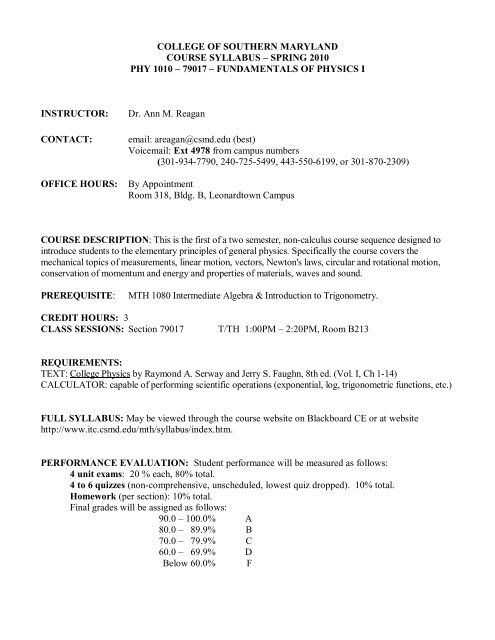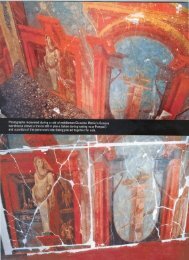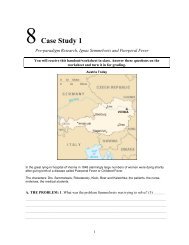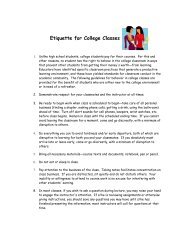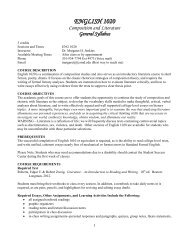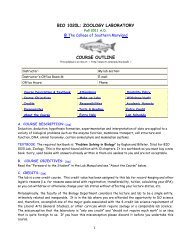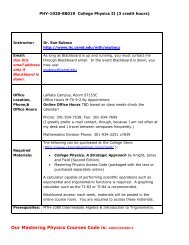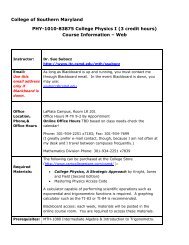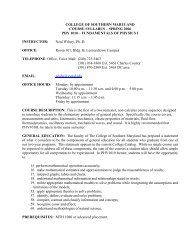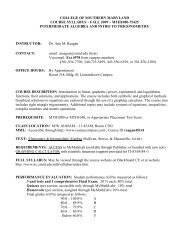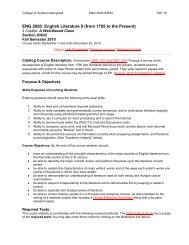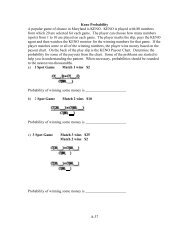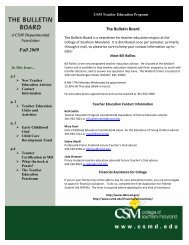syllabus - Distance Learning and Faculty Development - College of ...
syllabus - Distance Learning and Faculty Development - College of ...
syllabus - Distance Learning and Faculty Development - College of ...
Create successful ePaper yourself
Turn your PDF publications into a flip-book with our unique Google optimized e-Paper software.
COLLEGE OF SOUTHERN MARYLAND<br />
COURSE SYLLABUS – SPRING 2010<br />
PHY 1010 – 79017 – FUNDAMENTALS OF PHYSICS I<br />
INSTRUCTOR:<br />
CONTACT:<br />
OFFICE HOURS:<br />
Dr. Ann M. Reagan<br />
email: areagan@csmd.edu (best)<br />
Voicemail: Ext 4978 from campus numbers<br />
(301-934-7790, 240-725-5499, 443-550-6199, or 301-870-2309)<br />
By Appointment<br />
Room 318, Bldg. B, Leonardtown Campus<br />
COURSE DESCRIPTION: This is the first <strong>of</strong> a two semester, non-calculus course sequence designed to<br />
introduce students to the elementary principles <strong>of</strong> general physics. Specifically the course covers the<br />
mechanical topics <strong>of</strong> measurements, linear motion, vectors, Newton's laws, circular <strong>and</strong> rotational motion,<br />
conservation <strong>of</strong> momentum <strong>and</strong> energy <strong>and</strong> properties <strong>of</strong> materials, waves <strong>and</strong> sound.<br />
PREREQUISITE:<br />
MTH 1080 Intermediate Algebra & Introduction to Trigonometry.<br />
CREDIT HOURS: 3<br />
CLASS SESSIONS: Section 79017<br />
T/TH 1:00PM – 2:20PM, Room B213<br />
REQUIREMENTS:<br />
TEXT: <strong>College</strong> Physics by Raymond A. Serway <strong>and</strong> Jerry S. Faughn, 8th ed. (Vol. I, Ch 1-14)<br />
CALCULATOR: capable <strong>of</strong> performing scientific operations (exponential, log, trigonometric functions, etc.)<br />
FULL SYLLABUS: May be viewed through the course website on Blackboard CE or at website<br />
http://www.itc.csmd.edu/mth/<strong>syllabus</strong>/index.htm.<br />
PERFORMANCE EVALUATION: Student performance will be measured as follows:<br />
4 unit exams: 20 % each, 80% total.<br />
4 to 6 quizzes (non-comprehensive, unscheduled, lowest quiz dropped). 10% total.<br />
Homework (per section): 10% total.<br />
Final grades will be assigned as follows:<br />
90.0 – 100.0% A<br />
80.0 – 89.9% B<br />
70.0 – 79.9% C<br />
60.0 – 69.9% D<br />
Below 60.0% F
GENERAL EDUCATION: The faculty <strong>of</strong> The <strong>College</strong> <strong>of</strong> Southern Maryl<strong>and</strong> has prepared a statement <strong>of</strong><br />
what it considers to be the components <strong>of</strong> general education for all students who graduate from one <strong>of</strong> our<br />
two-year programs. This statement appears in the current <strong>College</strong> Catalog. While no single course can be<br />
expected to address all <strong>of</strong> these components, the sum <strong>of</strong> the courses a student takes should allow ample<br />
opportunity for all components to be experienced.<br />
In PHY1010 lecture, students will have the opportunity to:<br />
15. perform mathematical operations accurately;<br />
16. make mathematical estimates <strong>and</strong> approximations to judge the reasonableness <strong>of</strong> results;<br />
17. interpret graphs, tables <strong>and</strong> charts;<br />
18. underst<strong>and</strong> mathematical information <strong>and</strong> relationships stated in words;<br />
19. utilize appropriate mathematical models to solve problems while recognizing the<br />
assumptions <strong>and</strong> limitations <strong>of</strong> the models;<br />
35. apply appropriate theories to solve problems;<br />
57. identify, define, evaluate <strong>and</strong> solve problems;<br />
58. compare, contrast <strong>and</strong> classify information <strong>and</strong> concepts;<br />
59. recognize cause <strong>and</strong> effect;<br />
69. underst<strong>and</strong> methodologies <strong>of</strong> natural science;<br />
HOMEWORK: Homework completion is essential to success in this course. Each test <strong>and</strong>/or quiz will<br />
have at least one question based on an assigned Homework problem, so that the student’s grades on both<br />
will be greatly improved simply by completing <strong>and</strong> underst<strong>and</strong>ing Homework. Students may be called<br />
upon in class to demonstrate the solution to a Homework problem in front <strong>of</strong> the class. Additional<br />
worked problems will be posted online for students desiring more practice. Instructor will be available<br />
before or after class to review Homework.<br />
Homework problems for each chapter <strong>and</strong> quizzes for each section may be assigned for completion in<br />
class, at home, or via Blackboard/WebCT.<br />
ATTENDANCE POLICY: Attendance will be checked <strong>and</strong> recorded every class period. Student are<br />
expected to attend every class <strong>and</strong> will be responsible for any <strong>and</strong> all announcements, assignments,<br />
lectures, materials, h<strong>and</strong>outs, scheduled exams <strong>and</strong> unscheduled quizzes presented during class.<br />
Students who miss three or fewer classes will have an extra 10 points<br />
added to his/her lowest test grade.<br />
If you are fifteen minutes late or leave a class fifteen minutes early, you will<br />
be counted as absent for the purposes <strong>of</strong> assessing this bonus.<br />
AUDIT AND WITHDRAWAL POLICY: Students are reminded to consult the <strong>College</strong> Catalog for<br />
dates, procedures, responsibilities <strong>and</strong> impacts <strong>of</strong> changing registration status. Monday, March 29, 2010,<br />
is the last day to withdraw from a course or change from AUDIT status to CREDIT status or from<br />
CREDIT to AUDIT. Students changing to audit status must complete a contract with the course<br />
instructor before the deadline. Failure <strong>of</strong> an auditing student to comply with the terms <strong>of</strong> the contract will<br />
result in a grade <strong>of</strong> W for the course.
MAKEUP EXAM POLICY: Makeup exams will be allowed without penalty for legitimate reasons if<br />
the instructor is notified in advance or if an emergency occurs. Arrangements for make-up exams are the<br />
sole responsibility <strong>of</strong> the student <strong>and</strong> must be made directly with the instructor. Completion is generally<br />
required within one week <strong>of</strong> the originally scheduled date. No quiz make-ups will be allowed for any<br />
reason.<br />
STUDENT INTEGRITY POLICY: Students are expected to perform independently on exams <strong>and</strong><br />
quizzes without the use <strong>of</strong> unauthorized materials (books, solved problems, other individuals, etc.). Any<br />
violations <strong>of</strong> the Student Code <strong>of</strong> Conduct as outlined in the Student H<strong>and</strong>book result in a score <strong>of</strong> zero<br />
for the exam or quiz. The violation will be reported to the Director <strong>of</strong> Student Affairs <strong>and</strong> to the <strong>College</strong><br />
Judicial Committee for review <strong>and</strong> possible disciplinary action.<br />
DISABILITIES AND SPECIAL NEEDS: Students with disabilities who believe that they may need<br />
accommodations in this class are encouraged to contact Disabled Student Services in the <strong>Learning</strong><br />
Assistance Department at 301.934.7614 as soon as possible to better ensure that such accommodations are<br />
implemented in a timely fashion.<br />
UNAUTHORIZED PERSONS: Unauthorized persons (children, friends, family members, <strong>and</strong> any<br />
other persons not registered for the course) are not allowed in the classroom. Details <strong>of</strong> this college<br />
policy can be found in the Student H<strong>and</strong>book.
Department <strong>of</strong> Mathematics, Physics, <strong>and</strong> Engineering<br />
In order for you to be successful in your physics courses, the mathematics, physics, <strong>and</strong> engineering faculty has<br />
developed the following common expectations <strong>of</strong> all students in physics courses.<br />
1. As a student, you need to take responsibility for your own learning. This includes, but is not limited to:<br />
<br />
<br />
<br />
<br />
<br />
<br />
Arriving on time for each class<br />
Staying for the entire class <strong>and</strong> not leaving class early<br />
Actively participating in class <strong>and</strong> not sleeping or putting your head down<br />
Not engaging in other activities that detract from the classroom learning experience. No phone<br />
calls, text messaging, etc.<br />
Bringing the required materials to class. These might include textbooks, notebooks, binders,<br />
pencils, pens, <strong>and</strong> calculators.<br />
Taking care <strong>of</strong> all business (phone calls, bathroom breaks, getting food, drinks, things frOm cars,<br />
etc.) before class starts.<br />
2. You are expected to be an active learner in the classroom as well as out: to participate in group discussion,<br />
ask <strong>and</strong> answer questions, <strong>and</strong> work problems at the board.<br />
3. You are expected to study your textbook, not merely work problems from it. The best way to do this is to<br />
read the section To be covered before the lecture is given, listen to the lecture <strong>and</strong> take notes, <strong>and</strong> then<br />
study the text again before tackling the practice problems. If this seems like a lot <strong>of</strong> work, remember that<br />
you need to allot 2 hours outside <strong>of</strong> class for each hour in class. This time commitment increases for<br />
online, web-hybrid, <strong>and</strong> computer-assisted classes.<br />
4. There is no substitute for continued <strong>and</strong> ongoing Studying <strong>and</strong> doing homework problems. The best way to<br />
learn physics is to do physics.<br />
5. It is your responsibility to keep your homework up-to-date. If you are having difficulty with the course<br />
material, then you need to take action right away – do not wait until you have lost all hope! There are<br />
several options to get assistance:<br />
<br />
<br />
<br />
<br />
<br />
Talk to your instructor during <strong>of</strong>fice hours.<br />
Homework review is conducted prior to each class.<br />
Visit the student success center on campus. Tutors <strong>and</strong> hours are available at<br />
www.csmd.edu/StudentSuccess/Tutoring/<br />
Use online tutoring available at www.smarthinking.com<br />
Remember, quizzes <strong>and</strong> tests draw heavily from assigned homework.<br />
6. Realize that college level physics can be hard <strong>and</strong> is not always fun.<br />
7. You are given the means to keep track <strong>of</strong> your grade <strong>and</strong> are expected to take responsibility for knowing<br />
your grade status throughout the semester.
8. <strong>Learning</strong> physics is different from learning some other subjects. In a physics course, you must be able to<br />
do four things:<br />
a. Underst<strong>and</strong> the material.<br />
b. Process the material.<br />
c. Apply what you have learned to solve a problem correctly, <strong>and</strong><br />
d. Remember what you have learned in order to learn new material.<br />
9. Another reason that learning physics is different from learning other subjects is that it follows a sequential<br />
learning pattern, which simply means that the material learned on one day is used the next day <strong>and</strong> the next<br />
day, <strong>and</strong> so forth. This building block approach to learning physics is the reason it is difficult to catch up<br />
when you fall behind.<br />
10. <strong>College</strong> physics courses cover twice the material in the same time frame as do high school physics courses.<br />
<strong>Faculty</strong> members have a certain amount <strong>of</strong> material to be covered each semester. They have to finish<br />
certain chapters because the next course is based on the information taught in this course. Improve your<br />
study skills so you can keep up!<br />
11. Most physics problems involve the application <strong>of</strong> the laws <strong>of</strong> physics <strong>and</strong> the expression <strong>of</strong> these laws in<br />
mathematical terms. Students not only must underst<strong>and</strong> how to apply the physical laws but also must use<br />
mathematical principles well enough to complete the problems with enough speed to finish the test.<br />
12. During the first few days <strong>of</strong> class, do not take the attitude that “I already know this material” <strong>and</strong> start to<br />
slack <strong>of</strong>f by not taking notes or not completing homework assignments. Good study habits start from the<br />
first day <strong>of</strong> class. Start practicing good study habits now while the material is familiar to you. In that way,<br />
those habits will already be a part <strong>of</strong> your routine when the material becomes more challenging.<br />
13. Take pride in your work <strong>and</strong> never let yourself fall into the trap <strong>of</strong> believing that you cannot do physics. As<br />
a youth Einstein’s parents nicknamed him “die Dopperte”, the dopey one. Virtually everybody can do<br />
physics, if he or she is willing to work hard enough. Be persistent <strong>and</strong> determined in your work.
The following is intended to be an accurate outline <strong>of</strong> the course, but the instructor reserves the right to<br />
make modifications dependent upon pace <strong>and</strong> progress, subjects <strong>of</strong> special interest, <strong>and</strong> potential class<br />
cancellations (e.g., snow days, etc.).<br />
SESSION DATE<br />
1 1/19<br />
SUBJECT<br />
Introduction:<br />
What is Physics? St<strong>and</strong>ards <strong>of</strong> Length, Mass, <strong>and</strong><br />
Time; Coordinate Systems; Review <strong>of</strong> Trigonometry;<br />
Introduction to Vectors.<br />
TEXT<br />
SECTION<br />
Chapter 1<br />
2,3<br />
1/21<br />
1/26<br />
Motion in 1-Dimension: Displacement; average<br />
velocity; instantaneous velocity; acceleration; motion<br />
diagrams; one-dimensional motion with constant<br />
acceleration; freely falling objects.<br />
Chapter 2<br />
4,5<br />
1/28<br />
2/2<br />
6 2/4 TEST #1<br />
Vectors: Vectors <strong>and</strong> scalars revisited; some<br />
properties <strong>of</strong> vectors; components <strong>of</strong> a vector<br />
Two-Dimensional Motion: Velocity <strong>and</strong> acceleration<br />
in two dimensions; projectile motion; relative velocity<br />
Review for Test #1<br />
Chapter 3<br />
Chapters<br />
1,2,3<br />
7,8,9<br />
2/9<br />
2/11<br />
2/16<br />
The Laws <strong>of</strong> Motion: The concept <strong>of</strong> force; Newton’s<br />
First Law; Newton’s Second Law; Newton’s Third<br />
Law; some applications <strong>of</strong> Newton’s Laws; Force <strong>of</strong><br />
Friction<br />
Chapter 4<br />
10,11<br />
2/18<br />
2/23<br />
Work <strong>and</strong> Energy: Work; Kinetic Energy <strong>and</strong> Work-<br />
Kinetic Energy Theorem; Potential Energy;<br />
Conservative <strong>and</strong> Non-Conservative Forces;<br />
Conservation <strong>of</strong> Mechanical Energy; Non-<br />
Conservative Forces <strong>and</strong> the Work-Kinetic Energy<br />
Theorem; Conservation <strong>of</strong> Energy in General; Power;<br />
Simple Machines.<br />
Chapter 5<br />
12,13<br />
2/25<br />
3/2<br />
Momentum <strong>and</strong> Collisions: Momentum <strong>and</strong> Impulse;<br />
Conservation <strong>of</strong> Momentum; Collisions; Glancing<br />
Collisions.<br />
Review for Test #2<br />
Chapter 6<br />
14 3/4 TEST #2<br />
Chapters<br />
4,5,6
SESSION DATE<br />
15,16<br />
17,18<br />
19,20<br />
3/9<br />
3/11<br />
3/23<br />
3/25<br />
3/30<br />
4/1<br />
21 4/6 TEST #3<br />
22,23,24<br />
4/8<br />
4/13<br />
4/15<br />
SUBJECT<br />
Circular Motion <strong>and</strong> the Law <strong>of</strong> Gravity: Angular<br />
Speed <strong>and</strong> Angular Acceleration; Rotational Motion<br />
under Constant Angular Acceleration; Relations<br />
Between Angular <strong>and</strong> Linear Quantities; Centripetal<br />
Acceleration; Forces Causing Centripetal Acceleration;<br />
Describing Motion <strong>of</strong> a Rotating System; Newton’s<br />
Universal Law <strong>of</strong> Gravitation.<br />
Rotational Equilibrium: Torque; Torque <strong>and</strong> the<br />
Second Condition <strong>of</strong> Equilibrium; Center <strong>of</strong> Gravity;<br />
Examples <strong>of</strong> Objects in Equilibrium; Relationship<br />
Between Torque <strong>and</strong> Angular Acceleration<br />
Rotational Dynamics: Rotational Kinetic Energy;<br />
Angular Momentum. Review <strong>of</strong> chapters 7 <strong>and</strong> 8.<br />
Fluids <strong>and</strong> Gases: Density <strong>and</strong> Pressure; Variation <strong>of</strong><br />
Pressure with Depth; Buoyant Forces <strong>and</strong> Archimedes’<br />
Principle; Fluids in Motion; Other Applications <strong>of</strong><br />
Bernoulli’s Equation<br />
Review for Test #3<br />
Thermal Physics: Expansion <strong>of</strong> Solids; Ideal Gas<br />
Law; Avogadro’s Number; Heat as Energy - Latent<br />
Heat <strong>and</strong> Phase Change; Heat <strong>and</strong> Work, Entropy,<br />
Time Irreversibility, Energy Production<br />
TEXT<br />
SECTION<br />
Chapter 7<br />
Chapter 8<br />
Chapter 9<br />
Chapters<br />
7,8,9<br />
Chapter<br />
10,11,12<br />
25,26<br />
4/20<br />
4/22<br />
Vibration <strong>and</strong> Waves: Hooke’s Law; Position,<br />
Velocity <strong>and</strong> Acceleration as a Function <strong>of</strong> Time;<br />
Frequency; Amplitude, Wavelength; Types <strong>of</strong> Waves,<br />
Velocity, Reflection <strong>and</strong> Interference<br />
Chapter 13<br />
27,28<br />
4/27<br />
4/29<br />
29 5/4 TEST #4<br />
Sound: Sound Waves, Speed <strong>of</strong> Sound;<br />
Energy/Intensity; Doppler Effect: Interference <strong>and</strong><br />
St<strong>and</strong>ing Waves; Musical Instruments<br />
Review for Test #4<br />
Chapter 14<br />
Chapters<br />
10, 11, 13,<br />
14


